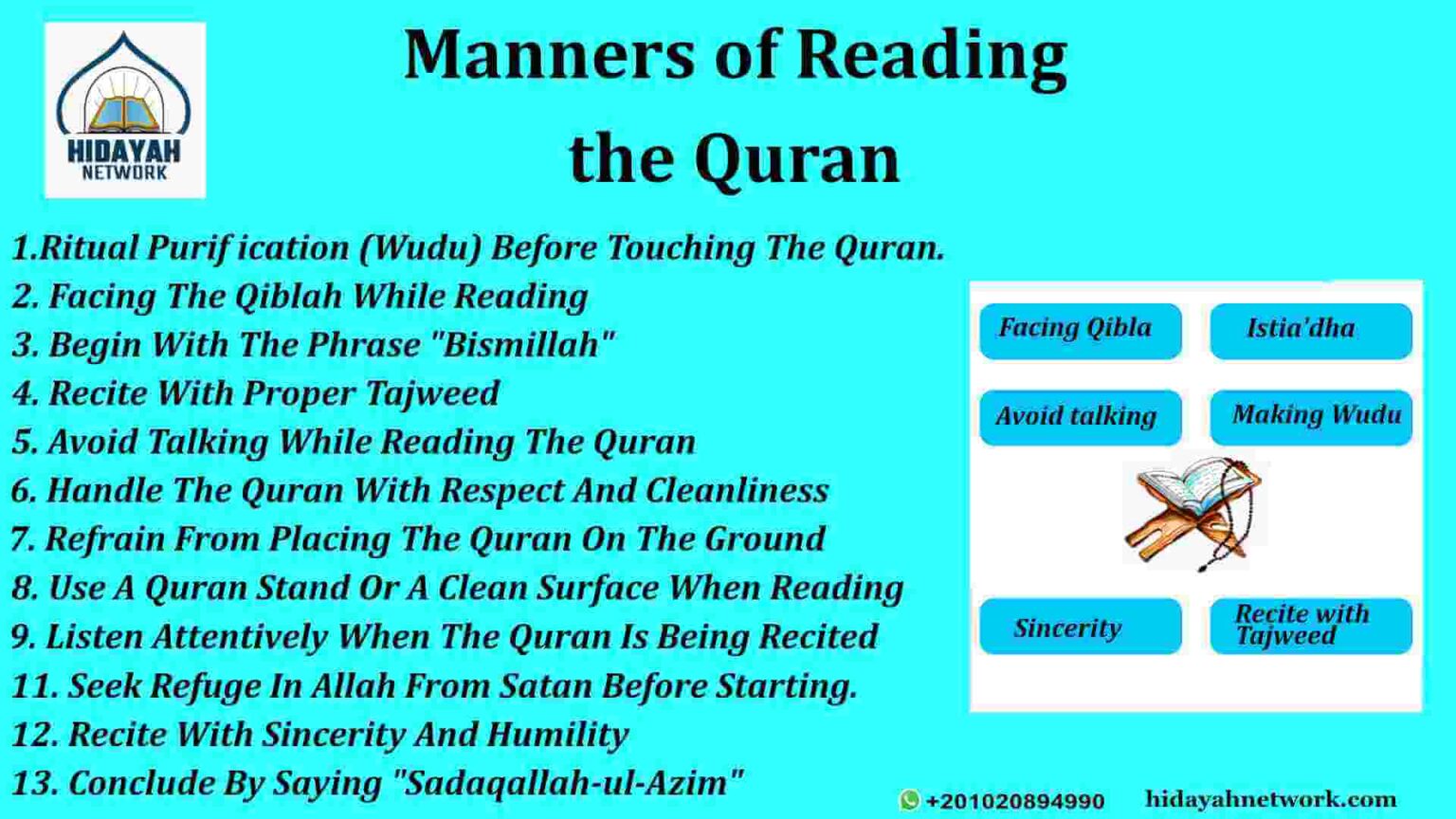Manners of Reading the Quran

- Hidayah
- Network
- | Role: Hidayah Network

Discovering the profound teachings of the Quran involves more than just reading its words; it’s about embracing a set of etiquettes that reflect reverence and sincerity. Today, we will share with you manners and etiquettes of reading the Quran that will double the reward and reading experience.
Before touching the Quran, ensure you are ritually purified with Wudu. Face the direction of Mecca, saying “Bismillah” to commence. Treat the Quran with utmost respect, avoiding placing it on the ground. As you recite, do so in a measured tone, pausing to understand and reflect on the verses, and so on. Let us guide you thoroughly on how you can implement these quran reading rules the Quran perfectly to gain the maximum reward from Allah (SWT).
Table of Contents
Toggle12 Manners of Reading the Quran
1. Ritual Purification (Wudu) Before Touching The Quran

Before engaging with the Quran, perform Wudu, a simple yet significant purification ritual. Prophet Muhammad (PBUH) emphasized the importance of cleanliness, stating, “The key to paradise is prayer, and the key to prayer is cleanliness.”
Wudu involves washing the:
- Hands
- Face
- Arms
- Feet
Ensuring a state of physical and spiritual cleanliness. This practice symbolizes respect for the divine words you are about to read, aligning with the Prophet’s teachings on the connection between cleanliness and spiritual elevation.
Get 40% OFF Now!
2. Facing The Qiblah While Reading

When reading the Quran, face the Qiblah, the direction of Mecca. This simple act symbolizes unity among Muslims worldwide, praying in harmony towards the same focal point.
The Prophet Muhammad (PBUH) illustrated this unity during his lifetime by consistently facing the Qiblah in prayer. It fosters a sense of community and connection, reminding believers of their shared faith and devotion to Allah. If you are reading quran alone or taking online quran recitation classes must move your face towards Qiblah.
3. Begin With The Phrase “Bismillah”
Commence reading the Quran with the sacred phrase “Bismillah,” meaning “In the name of Allah.” This practice signifies seeking Allah’s blessings and guidance before delving into His words.
Prophet Muhammad (PBUH) himself began various tasks, including reciting the Quran, with this phrase. It is a reminder to start every action with the name of Allah, acknowledging His presence and seeking His assistance in understanding and applying the divine teachings.
4. Recite With Proper Tajweed
Reciting Quran with proper Tajweed, or correct pronunciation, is essential for conveying the intended meanings accurately. The Prophet Muhammad (PBUH) emphasized the importance of reciting the Quran accurately, saying, “Whoever does not recite the Quran in a pleasant tone is not one of us.“
Tajweed ensures that the beauty and eloquence of the Quranic verses are preserved, enhancing the spiritual experience of the reader and those listening.
5. Avoid Talking While Reading The Quran
Maintain a focused and reverent atmosphere when engaging with the Quran by refraining from unnecessary speech. The Prophet Muhammad (PBUH) emphasized the importance of silence during the recitation of the Quran, stating, “The example of a believer who recites the Quran is that of a citrus fruit which tastes good and smells good.“
This analogy highlights the purity and goodness that comes from silently absorbing the divine words without distractions, allowing the essence of the Quran to permeate the heart and soul. Mosty in quran classes for kids, these youngsters talks a lots while taking quran classes so we can teach them manners.
6. Handle The Quran With Respect And Cleanliness
Treat the Quran with the utmost respect, as it contains the words of Allah. Keep it in a clean and elevated place, ensuring it is free from impurities.
Prophet Muhammad (PBUH) said, “Purify your mouths when you read the Quran.” Use clean hands, and avoid handling it when in an impure state. This reflects the reverence due to the divine scripture, fostering a sense of honor and humility.
Tips for Handling with Respect and Cleanliness
- Wash your hands before touching the Quran.
- Avoid eating while reading the Quran to prevent accidental spills or stains.
- Store the Quran in a clean, dedicated space.
- Use a Quran cover or wrap to protect it from dust and dirt.
- Refrain from touching the Arabic text without Wudu.
7. Refrain From Placing The Quran On The Ground
Show respect by never placing the Quran on the ground. The ground is considered less honorable than the divine words within the Quran.
Prophet Muhammad (PBUH) emphasized this by saying, “Do not make my grave a place of festivity. Send your prayers to me wherever you are, for your prayers reach me.” Elevate the Quran’s status by keeping it on a clean and designated surface.
8. Use A Quran Stand Or A Clean Surface When Reading
Optimize your reading experience by using a Quran stand or placing it on a clean, dedicated surface. This practice not only prevents the Quran from meeting impurities but also ensures a comfortable and focused reading environment.
The Prophet (PBUH) himself would recite the Quran while sitting or standing, emphasizing the importance of a conducive setting for engaging with the divine words.
Tips for Using a Quran Stand or Clean Surface
- Invest in a quality Quran stand for ease of reading.
- Choose a well-lit and quiet area for concentration.
- Clean the surface before placing the Quran.
- Position the Quran at eye level for comfortable reading.
- Avoid multitasking; give your full attention to the Quran.
9. Listen Attentively When The Quran Is Being Recited
When others recite the Quran, listen attentively, as the divine words hold immense spiritual benefit. Prophet Muhammad (PBUH) encouraged attentive listening, stating, “When the Quran is recited, listen attentively and remain silent.”
This practice not only demonstrates respect for the reciter but also allows the listener to absorb the profound meanings and guidance present in the verses.10. Understand The Meaning Of The Verses.
10. Seek Refuge In Allah From Satan Before Starting.
Before delving into the sacred words of the Quran, seek refuge in Allah from the influence of Satan. This practice is rooted in the hadith found in Sahih Bukhari (Book 61, Hadith 21), where Prophet Muhammad (PBUH) said, “When a person reads a verse, Satan departs from him till he finishes the whole chapter.”
This emphasizes the importance of seeking Allah’s protection from Satan’s distractions and distortions, allowing for a purer and more focused engagement with the Quran.
Tips for Seeking Refuge from Satan
- Begin by saying “A’udhu billahi min ash-shaytan ir-rajim” (I seek refuge with Allah from the accursed devil).
- Recite the specific verse “A’udhu billahi min ash-shaytan ir-rajim” before starting each chapter.
- Internalize the meaning of seeking refuge, acknowledging dependence on Allah’s guidance.
- Maintain concentration on the Quranic verses, keeping distractions at bay.
11. Recite With Sincerity And Humility
Approach the recitation of the Quran with sincerity and humility, recognizing its divine significance. Prophet Muhammad (PBUH) emphasized sincerity in worship, stating in Sahih Bukhari (Book 76, Hadith 577), “The reward of deeds depends upon the intentions.”
Infuse your recitation with a genuine desire to understand and apply the teachings, fostering a connection between your heart and the words of Allah.
Tips for Reciting with Sincerity and Humility
- Reflect on the intention behind reading the Quran; aim to seek knowledge and spiritual elevation.
- Recite with a heart full of gratitude and reverence.
- Humble yourself before the divine presence, recognizing your dependence on Allah’s mercy.
- Avoid showing off or seeking validation from others; let your sincerity be solely for Allah.
12. Conclude By Saying “Sadaqallah-ul-Azim”
Upon completing your recitation, conclude with the phrase “Sadaqallah-ul-Azim” to affirm the truthfulness of Allah’s words. This practice aligns with Prophet Muhammad’s (PBUH) example as narrated in Sahih Bukhari (Book 61, Hadith 24).
It signifies acknowledgment of the authenticity and power of the Quran, reinforcing your faith in the divine guidance it provides.
Final Words
These etiquettes serve as guiding lights, illuminating a path of reverence, sincerity, and connection with Allah. Embracing these practices not only enhances the spiritual experience but also deepens the bond with the divine words.
As you prepare to read the Quran, may these manners be the compass directing you towards a profound and fulfilling engagement with the timeless wisdom encapsulated within the pages of the Quran.

About Author
